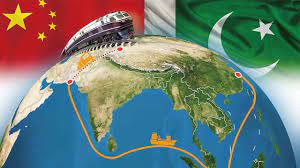The bond between Pakistan and China is one that has withstood the test of time, enduring every obstacle that has come their way.
 “CPEC is a testament to the enduring friendship between China and Pakistan, and it represents a shining example of regional cooperation and connectivity.” – Xi Jinping, President of China
“CPEC is a testament to the enduring friendship between China and Pakistan, and it represents a shining example of regional cooperation and connectivity.” – Xi Jinping, President of China
In the past ten years, the China-Pak Economic Corridor (CPEC) has become a vital project for building infrastructure around the world. It connects China’s western areas to the Arabian Sea through Pakistan, making it an important link between countries. This ambitious project started in 2013 and has been a catalyst for change in both countries. It has the potential to bring economic growth, regional connections, and better living standards to the area.
The China-Pakistan Economic Corridor (CPEC) project is a major initiative that aims to connect Gwadar port in Pakistan’s Balochistan province to China’s northwestern region of Xinjiang through an extensive network of highways, railways, and pipelines. The project is not just about infrastructure development but also about establishing a robust economic relationship between the two countries.
The CPEC project is an essential part of China’s Belt and Road Initiative (BRI), which is a massive infrastructure and trade project aimed at boosting China’s economic growth and expanding its influence in the world. The CPEC project is a vital component of the BRI, as it provides China with a shorter and more secure route to the Arabian Sea, bypassing the Malacca Strait, which is currently the busiest and most critical shipping lane in the world.
The CPEC project is not only crucial for China’s economic development but also for Pakistan’s economic growth and regional connectivity. The project will help Pakistan to overcome its chronic energy shortages, which have been a significant impediment to its economic growth. The project includes several energy projects, including coal-fired power plants, hydroelectric power stations, and wind farms, which will add approximately 17,000 megawatts of electricity to Pakistan’s national grid.
Moreover, the CPEC project will create numerous job opportunities for Pakistani youth. The development of special economic zones (SEZs) along the CPEC route is expected to attract foreign investment, technology transfer, and job creation. The SEZs are designed to provide a favorable environment for business, offering tax incentives, and streamlined regulatory procedures. The project is expected to create more than 2 million job opportunities for Pakistani youth by 2030.
The CPEC project has already started to show its impact on Pakistan’s economy. The project has helped to revive Pakistan’s construction industry, which had been in decline for several years. The construction of highways, railways, and pipelines has created thousands of job opportunities for local workers. The project has also increased Pakistan’s foreign direct investment (FDI), which had been low compared to other developing countries.
The CPEC project has been an excellent opportunity for China to expand its trade and investment footprint in South Asia, the Middle East, and Central Asia, while providing Pakistan with much-needed foreign investment and infrastructure development. The project is a flagship initiative of China’s Belt and Road Initiative (BRI), which aims to promote economic cooperation and connectivity among countries in Asia, Africa, and Europe.
The CPEC has progressed significantly over the past decade, with a focus on infrastructure and energy projects. The project has helped Pakistan address its chronic energy shortages, with the addition of over 6,000 megawatts of electricity to the national grid, reducing power outages and boosting economic activity. The CPEC project has also helped Pakistan develop its Blue Economy through the development of Gwadar port, which will provide a strategic trade route to China and the rest of the world.
CPEC has also played a crucial role in creating rural-urban synergy and regional connectivity in Pakistan. The SEZs along the CPEC route have attracted significant investment from Chinese companies, which has led to the creation of new employment opportunities and the transfer of technology and skills. The SEZs have also helped Pakistan diversify its export basket, with the export of agri-based products such as sesame seeds, seafood, and rice.China has been providing Pakistan with advanced agricultural technology, including drip irrigation systems, seed treatment, and pest control techniques. This technology transfer has helped Pakistan to improve its crop yields and reduce water wastage, resulting in increased agricultural production and revenue.
Despite the challenges posed by COVID-19, terrorism, and political instability, the CPEC project has continued to progress. The second phase of the project is focused on agriculture sector development, socio-economic projects, and academic partnerships to improve research and development collaborations. The CPEC project has the potential to transform Pakistan’s agricultural sector, which accounts for a significant share of the country’s GDP and employs more than 40% of the country’s labor force. The project aims to introduce modern farming techniques, improve water management, and increase the yield of crops such as cotton, wheat, and rice.
CPEC has helped Pakistan address its human development challenges, such as poverty, unemployment, and inequality. The project has created over 100,000 job opportunities for Pakistani youth and provided training and skills development to thousands of workers. The project has also helped improve Pakistan’s healthcare and education systems, with the establishment of hospitals, schools, and vocational training centers. It also helped Pakistan address its sustainability challenges, such as climate change, water scarcity, and environmental degradation. The project has introduced renewable energy technologies, such as wind and solar, to Pakistan’s energy mix, reducing the country’s reliance on fossil fuels. The project has also helped improve Pakistan’s water management system, with the construction of dams, reservoirs, and irrigation networks.
The bond between Pakistan and China is one that has withstood the test of time, enduring every obstacle that has come their way. The China-Pakistan Economic Corridor, being the star project of the Belt and Road Initiative, has brought about a plethora of advantages to both nations and the entire region. As we celebrate the 10th anniversary of the CPEC, it is crucial to reflect on its triumphs and look ahead with a sense of hopefulness. Through unwavering cooperation, partnership, and mutual regard, Pakistan and China can scale greater heights of progress and affluence, not just for their citizens but for the world at large.
(Hailing from the historic city of Peshawar (twinned with Urumqi), the erudite Secretary General of the Pakistan China Friendship Association has long been a proponent of the deep-rooted ties between the two nations. For those who wish to engage in further dialogue with this esteemed scholar, you may reach him at the following email address: [email protected].)


